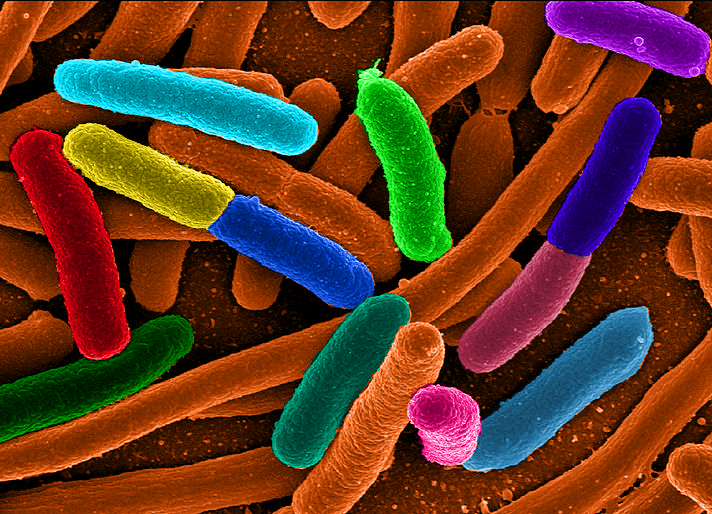
A microscopic sample of E. coli. Photo via Wikimedia Commons.
By Kyle Davidson
Capital News Service
Anglers are at risk of contracting E. coli while fishing in the Pine River, according to a recent study.
After a state agency determined in 2015 that the Pine River is unsafe for human contact, researchers from Alma College and the University of Toronto began to study the impacts of E. coli on fish in the river, which runs between Wheatland and Homer Township through Mecosta, Isabella, Montcalm, Gratiot and Midland counties.
According to the study, 73% of the fish studied tested positive for E. coli while 88% tested positive for other forms of fecal coliform bacteria.
The study cites agricultural runoff as the primary reason for the contamination. The Department of Environment, Great Lakes and Energy (DEGLE) also cites failing septic systems as a major source of E. coli.
According to the Mayo Clinic, E. coli is commonly contracted through contaminated food or water. Common symptoms include abdominal cramping and pain, nausea, vomiting and diarrhea. Infected children and older adults are also at greater risk of developing kidney failure from a more aggressive strain of the bacteria.
The Pine River is a popular recreation site.
While there is little research concerning E. coli risks from activities like kayaking and canoeing, the new study, published in the journal “Environmental Monitoring and Assessment,” singles out angling as a potentially hazardous activity.
That’s because fish have a mucus layer with the potential to harbor E. coli, leading to potential angler exposure, it said.
Exposure is likely to occur through cross-contamination while cleaning fish, as well as through oral exposure from unclean hands, the study said.
According to Liz Braddock, the director of the Environmental Health Division of the Mid-Michigan District Health Department, no E. coli warnings are posted on the Pine River. The district covers Clinton, Gratiot and Montcalm counties.
Chris Johnson, who serves on the Montcalm County Board of Commissioners, said fishing in the Pine River is still common. Among those activities are catch-and-release tournaments for smallmouth bass, which Johnson said typically bring in 10 boats or more.
Johnson said he’s thought about the possibility of contracting E. coli from handling fish and uses hand sanitizer while fishing, but doesn’t think the bacteria poses a threat for Pine River anglers.
When the researchers tested anglers, they found 50% had E. coli on their hands after the first and last catch of the day.
To avoid infection, Scott Dean, the strategic communications advisor for DEGLE, said the department recommends anglers think ahead. Precautions such as bringing hand sanitizer, avoiding contact with the face and washing hands after returning may help prevent infection.
DEGLE also advises the use of clean cooking techniques to prevent cross-contamination.